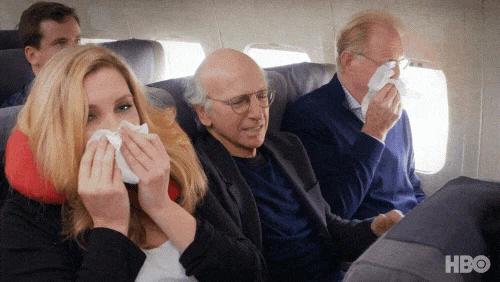Decongestants Are A Scam—Here's What To Do Next Time You're Sick
There is *almost* nothing worse than being sick. The only thing that beats having a flu or a cold is when the medicine you use to alleviate your symptoms is deemed ineffective.

In September of 2023, the FDA announced that most over-the-counter (OTC) decongestants commonly taken for colds are as “effective as a placebo.” So what are you supposed to do when you have a cold now? And how did our nation’s health authorities allow these medications to be sold in the market for so many decades? Tune in now to collect another reason why you can’t put all your trust in the pharmaceutical industry to better your health.
The Failure of OTC Decongestants
During my senior year of high school, I came down with the worst virus I’ve ever had. And I don’t just mean a little sniffles and headache – this was a 100-degree fever, chest pain where it hurt to breathe, a throat so sore it felt like glass was lining the inside. It was so severe that my parents actually let me stay home from school (which was a huge deal because I’m the daughter of a doctor who believes that life should go on unless you’re on your deathbed).

The strep, flu, and mono tests came back negative, so my doctor assumed it was just some unidentifiable virus that would “run its course.” She told me to rotate taking Mucinex and NyQuil, both OTC decongestants, and get lots of rest. Fast forward 10 days later, and I’m back in the doctor’s office in a far worse condition than before. This virus had evolved into an ugly form of pneumonia that had me coughing nonstop and bedridden for a week. And after Mucinex and NyQuil failed me, I had to take steroids in order to start feeling better. Clearly, this was not a virus that could just go away on its own, as my doctor had predicted. Instead, it was a perfect affirmation of what the FDA later revealed to the public – that OTC decongestants are essentially useless.
Late Breaking News in Decongestant Discussions
Because of my virus-turned-pneumonia experience, when the FDA announced that popular cold medicines caused insignificant symptom improvement last year, I was not surprised. After conducting several studies, an advisory board of health authorities concluded that there was insufficient evidence to support the efficacy of oral drugs containing phenylephrine in treating cold symptoms.
Phenylephrine (PE) is a chemical compound “in at least 250 products that were collectively worth about $1.8 billion in sales last year, including cold, flu, and allergy products from brands like Tylenol, Mucinex, Benadryl, Sudafed, NyQuil, and others,” writes Boston University.
Back in the ‘70s, when it was FDA-approved, phenylephrine was believed to be safe and mostly effective at relieving congestion, yet at this time, drugmakers were largely in charge of clinical trial data, which could have impacted the FDA’s approval. Additionally, 40 years ago, drug review processes did not adhere to the same strict standards that they do today. And current learnings about the way that oral phenylephrine is metabolized in the body have poked holes in previous theories.
Upon this September 2023 press release, CVS Pharmacies pulled popular oral phenylephrine products from its shelves and vowed to stop selling them moving forward. Now, public health officials are in a hot debate over whether all drugs with phenylephrine as the only active ingredient should be banned or remain on the market. Some experts in the field claim that phenylephrine still provides relief for some, but to the vast majority of patients, it’s no better than a placebo.

How Was Phenylephrine Proven Ineffective?
The basic way that decongestants work is by reducing the swelling in nasal blood vessels, which leads to less congestion and sinus pressure. However, the FDA deemed oral phenylephrine ineffective after taking a closer look at the way that it’s metabolized in the body. Research shows that oral phenylephrine is so finely broken down by the stomach that by the time it reaches the nose, it’s nearly dysfunctional.
However, not all decongestants are orally administered, and not all decongestants contain phenylephrine. Several drugs, like Sudafed, contain a highly effective chemical compound called pseudoephedrine (PDE), which works wonders for congestion. The hiccup with these types of medications is that they are considered “behind-the-counter” and require permission from a pharmacist to purchase. In 2006, the FDA mandated that pseudoephedrine be sold exclusively behind-the-counter because people were using it to make methamphetamine, an addictive and dangerous illicit substance.
The reason that oral pseudoephedrine works so well and oral phenylephrine doesn’t is because they are metabolized differently. And the reason that phenylephrine administered through the nose is more effective than the oral route is also due to the metabolism process. Now that we’ve completely debunked most of the popular cold medications on the market, let’s dive into what other measures you can take if you come down with something.

Alternative Treatment Options
You’re probably thinking to yourself: What am I supposed to do now when I have a cold if I can’t take decongestants? Don’t worry, there are other methods you can try to alleviate your sniffles.
Take Vitamin C and Zinc Regularly - There aren’t any studies that explicitly prove vitamin C and zinc will alleviate your cold symptoms, but there’s solid evidence that they strengthen your immune system if taken consistently. Doctors note that the best approach is to prevent colds as much as possible. Of course, this is easier said than done, but taking vitamins, washing your hands, getting plenty of rest, and maintaining a balanced diet are all great habits to embrace.
Use Nasal Sprays - Remember that the FDA ruled oral decongestants to be ineffective, but that doesn’t discount nasal sprays, even those containing phenylephrine. Since nasal sprays enter the affected area directly, they are much more reliable for relieving symptoms than oral medications. Sprays like Zicam and Afrin are great at getting rid of congestion.
Try NSAIDS - Over-the-counter painkillers like Advil (ibuprofen) or Tylenol (acetaminophen) are highly effective at relieving swelling, pain, and inflammation. While they may not necessarily relieve your stuffy nose or cough, they will definitely help a headache or sore throat.
Switch to Antihistamines - An antihistamine is defined as a medication used to relieve symptoms of allergies, such as runny nose, sneezing, itchy eyes, etc. Antihistamines like Zyrtec and Claritin are great options because they act like decongestants but under a different mechanism. Like phenylephrine, antihistamines reduce the swelling of blood vessels, but instead of constricting the vessel itself, they block the chemicals in the body responsible for this reaction to prevent congestion entirely.
Use a Humidifier or Take a Hot Shower - Hot water vapor is excellent at breaking up the mucus in your chest so you can cough it up and feel less congested. Breathing in moist air can also help with a scratchy or sore throat. So if you’re someone who gets chronic coughs, investing in a humidifier could be a great use of your money.

Sleep and Hydration - You’re probably tired of hearing how critical rest and fluids are when you’re sick, but there is truth to this age-old adage. The honest fact is that there is no cure for a common cold, but there are ways to keep your symptoms at bay and be easier on your body as it fights off a pesky virus. Getting enough rest and staying hydrated are both fantastic ways to give your body extra strength while it works to protect itself.
Consider Behind-the-Counter Options - Remember, not all decongestants were ruled ineffective. If you have a nasty virus that won’t go away, it may be worth talking to your healthcare provider or pharmacist about stronger decongestants, such as those containing pseudoephedrine. However, note that these medications are stronger and have more serious side effects than the OTC decongestants. Be sure to do your research before taking one.

Closing Thoughts
One of my main takeaways from the FDA’s statement in September 2023 was how powerful the human mind can be. The fact that consumers (myself included) have been purchasing medications like Mucinex, DayQuil, NyQuil, and more for decades when they provide close to zero relief is lunacy. But the power of conviction is great, and drug companies certainly have had us fooled. Let this serve as a reminder to always do your research, to remain skeptical of pharmaceutical corporations, and to remember that you are in control of your health.
Support our cause and help women reclaim their femininity by subscribing today.